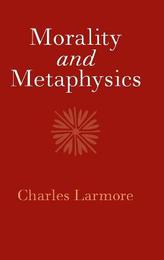
|
Morality and Metaphysics
Hardback
Main Details
| Title |
Morality and Metaphysics
|
| Authors and Contributors |
By (author) Charles Larmore
|
| Physical Properties |
| Format:Hardback | | Pages:230 | | Dimensions(mm): Height 235,Width 158 |
|
| Category/Genre | Philosophy - metaphysics and ontology
Ethics and moral philosophy |
|---|
| ISBN/Barcode |
9781108472340
|
| Classifications | Dewey:170 |
|---|
| Audience | | Professional & Vocational | |
|---|
| Illustrations |
Worked examples or Exercises
|
|
Publishing Details |
| Publisher |
Cambridge University Press
|
| Imprint |
Cambridge University Press
|
| Publication Date |
17 June 2021 |
| Publication Country |
United Kingdom
|
Description
In this book, Charles Larmore develops an account of morality, freedom, and reason that rejects the naturalistic metaphysics shaping much of modern thought. Reason, Larmore argues, is responsiveness to reasons, and reasons themselves are essentially normative in character, consisting in the way that physical and psychological facts - facts about the world of nature - count in favor of possibilities of thought and action that we can take up. Moral judgments are true or false in virtue of the moral reasons there are. We need therefore a more comprehensive metaphysics that recognizes a normative dimension to reality as well. Though taking its point of departure in the analysis of moral judgment, this book branches widely into related topics such as freedom and the causal order of the world, textual interpretation, the nature of the self, self-knowledge, and the concept of duties to ourselves.
Author Biography
Charles Larmore is W. Duncan MacMillan Family Professor in the Humanities at Brown University. He is author of thirteen books, including The Morals of Modernity (Cambridge, 1996), Les pratiques du moi (2004), The Autonomy of Morality (Cambridge, 2008), Das Selbst in seinem Verhaltnis zu sich und zu anderen (2017), and What is Political Philosophy? (2020).
Reviews'In resolute opposition to popular expressivist and constitutivist views that have emerged from the traditions of Hume and Kant, Charles Larmore offers an account of morality that does not shy away from its metaphysical commitments. Starting from the contention that moral judgments purport to describe attitude-independent moral facts, which furnish objective reasons that can move us to act so far as we are rational, Larmore develops an ontologically robust account of these reasons as constituting a distinct dimension of reality, not reducible to the physical and psychological realms countenanced by contemporary naturalism. The fruit of long reflection, this erudite and passionately argued book merits the attention of anyone interested in these topics.' Stephen Engstrom, University of Pittsburgh
|